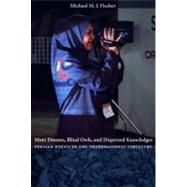Mute Dreams, Blind Owls, and Dispersed Knowledges
, by Fischer, Michael M. J.- ISBN: 9780822332985 | 0822332981
- Cover: Paperback
- Copyright: 9/1/2004
Over the past decade Iranian films have received enormous international attention, garnering both critical praise and popular success. Combining his extensive ethnographic experience in Iran and his broad command of critical theory, Michael M. J. Fischer argues that the widespread appeal of Iranian cinema is based in a poetics that speaks not only to Iran's domestic cultural politics but also to the more general ethical dilemmas of a world simultaneously torn apart and pushed together. Approaching film as a tool for anthropological analysis, he illuminates how Iranian filmmakers have incorporated and remade the rich traditions of oral, literary, and visual media in Persian culture. Fischer reveals how the distinctive expressive idiom emerging in contemporary Iranian film reworks Persian imagery that has itself been in dialogue with other cultures since the time of Zoraster and ancient Greece. He illuminates a range of narrative influences on recent Iranian cinema, including Zorastrian ritual as it is practiced in Iran, North America, and India; the mythic stories, moral lessons, and historical figures written about in Iran's national epic, the Shahnameh; the dream-like allegorical world of Persian surrealism exemplified in the Sadeq Hedayat's 1939 novella The Blind Owl; and the politically charged films of the 1960s and 1970s. Fischer contends that by combining these traditions with cosmopolitan influences, Iranian filmmakers-many of whom studied in Europe an America-have developed new modes of accessing the ethical and political experiences of ancient Persian traditions and communicating these experiences to transnational audiences.






